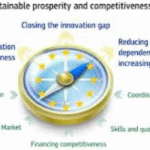In a new push for digital sovereignty, the French government has relaunching efforts for a sovereign cloud project, aiming to reduce dependency on global giants like Amazon, Microsoft, and Google. These tech companies control over half of the global cloud services market and more than 70% in Europe, presenting a significant challenge to European technological independence.
Read Also: Elon Musk’s Call for Free Trade and Economic Cooperation with Europe
The Need for a European Champion in Cloud Computing
The issue of cloud sovereignty in Europe has been a longstanding concern. Despite the presence of strong local companies such as OVH, a French leader in the cloud sector, Europe still lacks a dominant cloud player to rival the American tech giants. Patrick Pouyanné, CEO of TotalEnergies, voiced his concerns in early April 2025, emphasizing that he is faced with a choice between Amazon and Microsoft for cloud services but is uncomfortable about storing his company’s data with these providers. He added, “We are trying to build a French cloud, but no company is adopting it.”
The Impact of Trump’s Protectionist Policies
This issue has become even more pressing due to the protectionist policies of former U.S. President Donald Trump, which have reshaped the landscape of global data sovereignty. His administration’s approach has increased the risks of storing data with non-European cloud providers, prompting calls for more secure and independent alternatives within Europe.
The French government is responding to these challenges by reinvigorating efforts to create a cloud infrastructure that would ensure data security and control within the EU. The aim is to establish a European cloud solution that will be more attractive to businesses and institutions wary of relying on foreign-based services.
Why the French Cloud Struggles to Gain Traction
While the need for a European cloud solution is clear, the reality is that French and European initiatives face significant obstacles. The lack of adoption of domestic cloud services, despite efforts to promote them, remains a major issue. Many companies are hesitant to shift from established global cloud providers due to concerns over compatibility, cost, and service reliability.
The French government and industry leaders are aware that for a sovereign cloud to succeed, it must offer not only strong data security but also the technological performance and scalability of global providers. Overcoming these hurdles will require substantial investment, collaboration across Europe, and a shift in mindset among businesses.
Next Steps for the Sovereign Cloud Project
The relaunch of the sovereign cloud project aligns with broader efforts by the European Union to enhance digital sovereignty and reduce dependence on foreign technologies. The French government is expected to continue pushing for regulatory and financial support for homegrown cloud solutions, hoping to foster a robust ecosystem of European cloud providers.
Future Challenges and Opportunities
While creating a successful European cloud solution is no small feat, it presents significant opportunities. A sovereign cloud would allow European businesses to store and process data in a way that aligns with local privacy regulations, reducing the risk of data breaches and ensuring compliance with EU data protection laws.
Moreover, developing such infrastructure would help Europe remain competitive in the growing digital economy, safeguarding sensitive data and enhancing innovation in the tech sector. The next few years will be crucial in determining whether Europe can build a sustainable and secure alternative to the current dominance of U.S. cloud providers.
This article is orignally published on: ouest-france.









